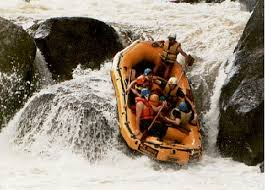Navigating the Narrows of a Complicated Future

This Christmas and Chanukah season we are thinking of the Exodus of the Jews from Egypt. In Hebrew, the word for Egypt is mitzrayim, which means "narrows" or "straits" [probably derived from the narrow straits of the Nile in northern Egypt], a place of rapids and white water, requiring great skill to survive. The narrows are both a physical and psychological reality. We can be in "tight spots" because our funds and our luck are running out, our opponents are closing in, or we are unable to see any possibilities beyond gloom and doom.
This era, like many others, is full of dangerous narrows and rapids. Many things happen and many conditions arise for which we are completely unprepared. We've got to scramble hard to get through. Our increasingly interconnected world means that events that might have had relatively minor implications in the past now have the possibility of impinging upon our consciousness globally.
For example, hostilities between ethnicities and nationalities are becoming more complex as the 21st century progresses. The "we" consciousness between groups is proliferating, and the "us" politics of community consciousness is being relegated to the sidelines. These identity politics frequently play out with ruthless violence.
Nowhere are these tectonic forces of ethnic friction more on display than in the Middle East, a perennial hotspot of conflicting aspirations and interests. Hostilities between Islamists, minority religious groups, and secularists are poignantly on display in Egypt and Syria, where an intricate vortex of revolutionary and religious activity threatens to explode into permanent instability.
In the midst of this turmoil is Israel, which has its own complex political make up. Of course, this small country is a pariah to many of its neighbors; quite a few remain in a formal state of war with the Jewish state. It's a society that has to do a good job of navigating the narrows.
What can we learn from Israel? What enables it
to keep going in spite of seemingly overwhelming odds? A recent interview by Tom Friedman with retiring Israeli politician, Ehud Barak, pointed us toward an answer to this question. With regard to the huge political forces, with deep roots, now playing out around
Israel, particularly the rise of political Islam, Barak said...
'We have
to learn to accept it and see both sides of it and try to make it
better. I am worried about our tendency to adopt a fatalistic,
pessimistic perception of history. Because, once you adopt it, you are
relieved from the responsibility to see the better aspects and seize the
opportunities when they arise...you lose sight of the opportunities
and the will to seize opportunities. ...I know that you can’t say when
leaders raise this kind of pessimism that it is all just invented. It is
not all invented, and you would be stupid if you did not look [at it]
with open eyes. But it is a major risk that you will not notice that you
become enslaved by this pessimism in a way that will paralyze you from
understanding that you can shape it. The world is full of risks, but
that doesn’t mean that you don’t have a responsibility to do something
about it — within your limits and the limits of realism — and avoid
self-fulfilling prophecies that are extremely dangerous here.' ”
 This point applies to all of us living in and navigating through these challenging times.
This point applies to all of us living in and navigating through these challenging times. In this era of
polarization and economic stagnation in the West, there is much to be pessimistic about. But, if pessimism is the totality of one's world view, there is a great risk that all sorts of other options and possibilities will go unnoticed.
Art of the Future believes that hope is always a possibility. There is hope, for example, that the Arab Spring will not yield another round of authoritarianism but, rather, result in a recognition that listening closely to differing perspectives, will result in a deeper level of societal learning and functioning. Regardless of the unsettling forces at work in the world - global warming, youth who lacking concentration or engagement, economic bankruptcy, etc., etc. - there is always the possibility that things could turn out much more beautifully than ever imagined.
A recent video from Paraguay demonstrates the validity of this view. In "The World Sends us Garbage and We Send Back Music," people with absolutely nothing materially - children finding food in landfills - are still able to create an orchestra! I want to break down and cry about the power of the human spirit! Like Patti Smith says, The People Have the Power and ain't nothin' goin' to turn 'em around once they get started!
Circling back to the religious nature of December, another piece of ancient Hebrew thinking about the possibilities that confront us all goes like this...
המצר קראתי י-ה ענני במרחב י-ה מן
"From the narrow I called out for God, God answered me with expansiveness."
Whatever our condition and the condition of the world that is our context, we have the possibility of greater consciousness, the prospect of moving from the narrows into the larger sea.
In 2013, may we choose expansiveness.
Best wishes for an abundant new year!

2 comments:
And we should not be dissuaded by the enormity of the tasks required to leave the world in better condition than we found it. We should take action where we can....Rabbi Tarfon said: You are not required to complete the work, but neither are you free to abstain from it…Pirke Avot, 2:20
It's nice to have a thoughtful and intelligent take on what is truly a narrows in which we have to surrender security and rely on our wits.
Many thanks for your good wishes, which I return in kind.
Post a Comment